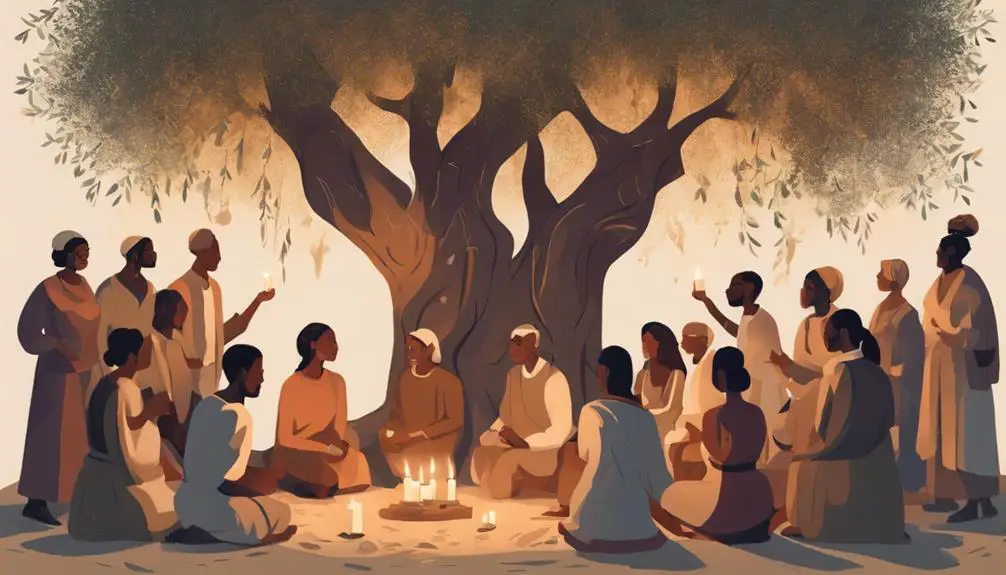Learn how the Bible's tales of unity and compassion reveal timeless truths about the power of connection, and find inspiration for today's world.

The Power of Connection in the Bible
When you wander through the pages of the Bible, you'll uncover that it's more than just a collection of ancient texts; it's a treasure trove of stories emphasizing the strength of connections.
You'll find that from the unity in the early church to the compassion shown in the parables, these bonds have always been at the heart of divine teachings.
As you explore these narratives, you'll begin to see how these connections aren't just historical anecdotes but carry profound relevance for today's world.
There's an invitation here to uncover how these principles can transform not only your personal life but also how you interact with the world around you.
Key Takeaways
- Spiritual intimacy with the divine is nurtured through mutual commitment and experiential engagement, as demonstrated in biblical teachings.
- The early church's unity was deeply rooted in communal living and shared beliefs, emphasizing the importance of connection and support among believers.
- Biblical parables teach the crucial role of empathy, forgiveness, and kindness in building and maintaining meaningful human connections.
- Engaging in compassionate acts and fostering community are essential for emotional resilience and overcoming social isolation, aligning with biblical principles of interconnectedness.
Foundations of Divine Bonding

Exploring the concept of divine bonding in the Bible reveals a foundational truth: your relationship with the divine is built on mutual commitment and active engagement. This principle is deeply rooted in the concept of covenant relationships. Unlike contracts, which are often transactional and temporary, covenants in the biblical sense are enduring and based on a profound level of trust and fidelity. They're not just agreements but solemn vows that forge an unbreakable bond between you and the divine.
Such covenant relationships pave the way for spiritual intimacy, which is characterized by an open, honest, and heartfelt connection with the divine. This form of intimacy goes beyond mere knowledge of sacred texts, reaching into the depths of personal experience and transformation. It's in this sacred space that you're not just following rituals or adhering to religious edicts, but actively participating in a divine dialogue.
Through this lens, the Bible isn't just a collection of historical narratives or ethical guidelines but a roadmap to cultivating a deep, personal relationship with the divine. It invites you into a journey of mutual discovery, where spiritual intimacy flourishes through sincere commitment and engagement.
Unity in the Early Church
Building on the foundation of divine bonding, the early church exemplified unity through its communal practices and shared beliefs. This period, marked by a profound sense of fellowship, was deeply rooted in the apostolic teachings. These teachings weren't just doctrines; they were the very lifeblood that sustained the collective spirit of the early believers. You can't help but notice how these foundational principles fostered a unique environment where communal sharing wasn't an obligation but a joyful expression of faith and love.
The early church's unity wasn't superficial. It was a robust framework built upon the apostolic teachings, which emphasized the importance of living in harmony, sharing resources, and supporting one another. This ethos of communal sharing transcended mere physical possessions; it extended to emotional and spiritual support, knitting the community tightly together. In this context, unity wasn't an abstract concept but a tangible reality, manifested in the daily lives of the believers.
The early church's commitment to these principles showcases a profound understanding of connection, one that goes beyond individualism to embody the collective embodiment of faith and love. This period serves as a compelling testament to the power of unity, grounded in shared beliefs and communal practices.
Lessons From Biblical Parables

Delving into biblical parables reveals timeless lessons on human nature, morality, and divine principles, offering profound insights into the essence of connection and community. These stories, rich with symbolism and teaching, guide you towards a deeper understanding of your place within the broader tapestry of human relationships and spiritual destiny.
Parable |
Lesson on Connection |
|---|---|
The Sower |
The Sower's metaphor teaches the importance of nurturing relationships and communities with care and wisdom. Just as seeds flourish in good soil, so do people in environments that foster growth and understanding. |
The Prodigal Son |
The Prodigal's return highlights the power of forgiveness and reconciliation. It underscores the idea that no gap is too wide to bridge when it comes to restoring broken connections. |
The Good Samaritan |
This story illustrates the universal bond of empathy and kindness that transcends cultural, religious, or ethnic barriers, urging an inclusive approach to community. |
The Mustard Seed |
Demonstrating faith's exponential impact, this parable encourages the cultivation of small acts of connection that can grow into vast networks of support and belonging. |
These parables serve not only as moral compasses but as calls to action, inviting you to weave stronger, more compassionate connections in your own life.
Healing Through Compassionate Acts
Healing through compassionate acts is a fundamental principle woven throughout the tapestry of biblical teachings, offering a profound avenue for restoration and connection. This concept, deeply embedded in scripture, encourages you to extend kindness and empathy towards others, which not only aids in their healing but also enhances your own emotional resilience and spiritual intimacy.
Consider the following insights:
- Emotional Resilience: Engaging in compassionate acts strengthens your capacity to navigate personal adversities. It's as though by lighting another's path, you fortify your own inner light, enabling you to withstand life's storms with greater fortitude.
- Spiritual Intimacy: Acts of compassion draw you closer to the divine, reflecting the very essence of spiritual teachings. This intimacy isn't about proximity but about embodying the qualities that foster a deeper connection with the spiritual realm.
- Mutual Restoration: The beauty of compassion lies in its reciprocity. In offering solace, you too receive healing. This mutual exchange fosters a sense of belonging and interconnectedness, pivotal for communal harmony.
In essence, compassionate acts serve as a catalyst for healing, enhancing both emotional resilience and spiritual intimacy. This biblical principle underscores the transformative power of empathy, urging you to act as conduits of compassion in a world in dire need of healing and connection.
Fostering Community and Fellowship

In the vein of compassionate acts, fostering community and fellowship embodies another essential biblical principle that enriches both individual and collective spiritual journeys. The Bible emphasizes the importance of community in combating social isolation, a challenge that's increasingly prevalent in our modern society. You'll find that scriptures advocate for the coming together of individuals, transcending cultural differences to form a unified body in Christ. This unification serves not only as a testament to the power of faith but also as a practical approach to alleviating the loneliness and disconnectedness many experience today.
Delving deeper, the biblical call to fellowship isn't just about gathering; it's a profound encouragement to engage deeply with one another, reflecting Jesus' teachings on love and acceptance. This engagement often requires navigating cultural differences with grace and understanding, highlighting the Bible's forward-thinking stance on inclusivity. By fostering such environments, you're participating in a divine act of building bridges across diverse communities, ensuring that no one feels isolated due to their background or beliefs.
Ultimately, the biblical emphasis on community and fellowship serves as a powerful antidote to the alienation modern life can bring, reminding us that our strength lies in our unity, not in our isolation.
Frequently Asked Questions
How Do Modern Technology and Social Media Platforms Influence Our Understanding and Practice of Biblical Principles of Connection?
Modern technology and social media platforms significantly shape your understanding and practice of connection principles, through digital evangelism and privacy concerns.
They've transformed how you share and consume spiritual content, making it accessible but also raising questions about personal boundaries online.
This digital shift requires you to critically evaluate how these tools align with or challenge biblical teachings on community and relationships, ensuring your digital footprint reflects your faith values.
In What Ways Can Non-Christian or Secular Communities Benefit From the Biblical Concept of Connection Without Adhering to the Faith Itself?
As the saying goes, 'A rising tide lifts all boats,' so too can universal empathy and interfaith dialogue, rooted in biblical concepts of connection, benefit secular communities.
You don't need to share the faith to appreciate its wisdom on forging strong bonds. These principles encourage understanding across diverse beliefs, fostering a sense of unity and mutual respect.
How Do Differences in Denominational Teachings Impact the Interpretation and Importance of Connection in the Bible?
Denominational diversity shapes how you understand the Bible's teachings on connection. Different sects interpret scriptures in unique ways, leading to varied emphases on the concept of connection.
This diversity isn't just academic; it influences how communities build relationships and engage with the broader world. Understanding these differences is crucial, as it sheds light on the rich tapestry of beliefs and practices that define Christian faith and its approach to fostering connections.
What Are the Psychological Effects of Practicing Biblical Connection Principles in a Highly Individualistic Society?
Imagine planting a tree in a desert; it's tough but not impossible. Practicing biblical connection principles in a highly individualistic society can feel similar. It's challenging, yet neuroscience insights reveal it fosters emotional resilience.
You're wiring your brain for deeper empathy and stronger social bonds, akin to a tree finding water in arid land. This resilience is crucial for navigating life's storms, showcasing the profound impact of these practices on your mental well-being.
Can the Concept of Connection in the Bible Provide Insights Into Resolving Contemporary Global Conflicts, and if So, How?
When exploring solutions for global conflicts, you'll find that the concept of connection can indeed offer valuable insights. By applying principles of environmental stewardship and economic justice, rooted in a sense of community and solidarity, you're able to address root causes of conflicts.
This approach fosters a more equitable and sustainable world, demonstrating how interconnectedness can lead to innovative and inclusive solutions for pressing international issues.
Conclusion
In analyzing the biblical narrative, it's evident that the power of connection transcends mere association, embedding itself as a divine mandate for communal harmony.
Through early church unity, parabolic teachings, and acts of compassion, Scripture illustrates a profound truth: our strength lies in togetherness.
This divine principle of connection not only fosters community and fellowship but also facilitates healing.
Thus, embracing this sacred bond offers a transformative pathway towards collective flourishing, underscoring the indispensable value of interconnectedness in fulfilling our spiritual and communal potential.



Sign up